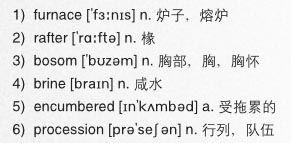桥
2013-11-08
I stood on the bridge at midnight, As the clocks were striking the hour,
And the moon rose oer the city,
Behind the dark church-tower.
I saw her bright reflection In the waters under me, Like a golden goblet falling And sinking into the sea.
And far in the hazy distance
Of that lovely night in June, The blaze of the flaming 1)furnace Gleamed redder than the moon.
Among the long, black 2)rafters The wavering shadows lay, And the current that came from the ocean
Seemed to lift and bear them away; As, sweeping and eddying through them, Rose the belated tide, And, streaming into the moonlight, The seaweed floated wide. And like those waters rushing Among the wooden piers, A flood of thoughts came oer me
That filled my eyes with tears. How often, O, how often,
In the days that had gone by, I had stood on that bridge at midnight
And gazed on that wave and sky! How often, O, how often,
I had wished that the ebbing tide Would bear me away on its 3)bosom
Oer the ocean wild and wide!
For my heart was hot and restless,
And my life was full of care,
And the burden laid upon me Seemed greater than I could bear.
But now it has fallen from me, And is buried in the sea; And only the sorrow of others Throws its shadow over me. Yet whenever I cross the river
On its bridge with wooden piers, Like the odor of 4)brine from the ocean Comes the thought of other years. And I think how many thousands
Of care-5)encumbered men, Each bearing his burden of sorrow, Have crossed the bridge since then.
I see the long 6)procession Still passing to and fro, The young heart hot and restless, And the old subdued and slow! And forever and forever,
As long as the river flows, As long as the heart has passions, As long as life has woes; The moon and its broken reflection
And its shadows shall appear, As the symbol of love in heaven,
And its wavering image here.
午夜伫桥上,报时钟正响,幽黑塔楼后,月升照城邦。
但见月清影,脚下水中映,如同金杯盏,沉降入海心。
远在迷蒙处,可爱六月夜,熔炉之烈焰,闪烁红胜月。
黑长椽桩间,摇晃阴影藏,洪流海上来,似将其涤荡。
涡流冲刷时,晚潮升涨起,海草连片浮,漂漂入月光。
如水奔腾急,洗刷木桥桩,思潮涌我心,泪水顿盈眶。
多少多少回,逝去时日里,午夜桥上立,凝目水与天。
多少多少回,但愿退潮水,携我入海洋,遥至海尽头!
我心躁难安,人生虑重重,身上之重负,似非我能担。
如今重负去,长埋深海里;惟有他人悲,笼罩我心底。
每当河上过,踏足木桥上,如同咸潮味,经年思绪回。
遥想那时起,多少人心悴,个个悲戚戚,忧忧过此桥。
但见行列长,来去亦如常,幼者心焦灼,长者慢悠悠!
永远复永远,只要河流淌,只要心激昂,生活存悲伤。
明月与碎影,将会把身亮,天上爱之象,摇曳水中央。
赏析
亨利·沃兹沃斯·朗费罗(Henry
Wadsworth Longfellow,1807—1882),19世纪美国最伟大的浪漫主义诗人之一,牛律大学和剑桥大学曾分别授予他荣誉博士学位。伦敦威斯敏斯特教堂诗人之角安放了他的胸像,他是获得这种尊荣的第一位美国诗人。他一生创作了大量抒情诗、叙事诗、歌谣和诗剧,在美国和欧洲广泛流传。主要作品有《夜吟》(Voices of the Night,1839)、《伊凡吉林》(Evangeline,1847)、《海华沙之歌》(The Song of Hiawatha,1855)、《迈尔斯·斯坦狄什的求婚》(The Courtship of Miles Standish and Other Poems,1858)等等。
《桥》写于1845年,所描写的夜景位于波士顿的查尔斯河河畔,当时的桥称为西波士顿桥。朗费罗在追求其第二任妻子期间,曾多次在此桥上往返。1907年,新桥开通,为了纪念这位让桥畔美景流芳百世的诗人,遂命名为朗费罗桥。桥两旁立着小小的塔,远看貌似巨型的盐罐与胡椒罐,因此有“盐巴与胡椒桥”的昵称。
朗费罗当年吟诵的桥还是木桥,而就算是新桥也经历了百年沧桑,但桥下数百年不变的波浪滔滔却让我们一下子回到那又黑又长的桥桩旁边。明月、小桥、流水,我们或许看过了太多太多的睹物伤怀。诗仙李白曾借月发出这样的感慨,“今人不见古时月,今月曾经照古人。古人今人若流水,共看明月皆如此。”而此刻,换作朗费罗的《桥》,所表达的无奈与慨叹一样能刺痛我们的神经。人一生无论看过多少次月亮,走过多少桥,流转的无非也就是短暂的人生,你我他,匆匆几十年。而那月、那桥,却是用亘古不变的姿态,坐看每个过客,或喜或悲,来去如风。有时候,恐怕连我们也不得不嘲笑自己:人生逃不过几十年后殊途同归,为何总要来去忧心忡忡?
